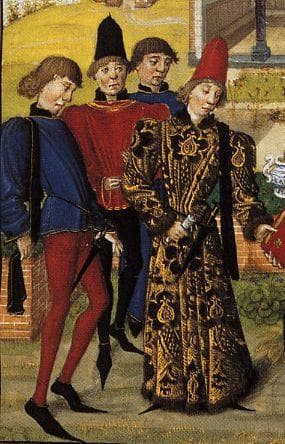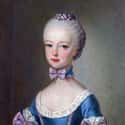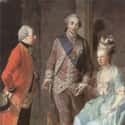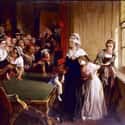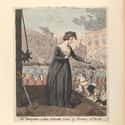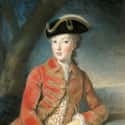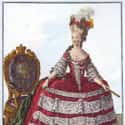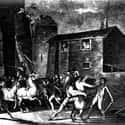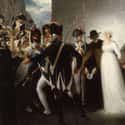-
(#1) She Got Married At The Painfully Young Age Of 14
Her Austrian mother and the French king brokered the marriage between Marie Antoinette and Louis, the Dauphin and future King of France. It was a brilliant match for a younger daughter of an Austrian empress, and one that intended to bring peace between France and Austria. But the participants were quite young: Louis was only 15 and Marie Antoinette was 14. Despite their young age, their marriage was celebrated by the two families.
The couple did not actually meet until after their marriage - they married by proxy in April 1770. The new Dauphine of France then began a multi-week journey from Austria to her new home in the French court. She would never see Austria or her mother again.
-
(#2) She Was A Virgin Until She Was 21
Though Louis was kind to Marie Antoinette, their relationship stalled from the start - the royal couple did not immediately consummate their marriage. It took years of coaxing by both Marie Antoinette and her family. Maria Theresa counseled her daughter in letters from Austria and she even sent her son and heir Joseph II to France to give Louis a pep-talk into finally bedding his wife. In total, it took the couple seven years to consummate the marriage.
-
(#3) The Revolutionary Tribunal Accused Her Of Incest
As the French Revolution became more radical and rejected the possibility of a constitutional monarchy, Louis XVI and his wife were put on trial by a revolutionary tribunal. Louis was the first to be guillotined - he was executed in January 1793, only days after his sentencing.
Marie Antoinette’s trial happened six months later. The 32-hour trial was draining and humiliating for the ill queen, especially when prosecutors accused her of incest with her young son. Mustering up every ounce of dignity she had, the widowed former queen delivered a reply that shamed the courtroom into silence: “Nature refuses to answer such a charge brought against a mother. I appeal in this matter to all the mothers present in court.”
Her appeal may have restored her honor, but it did not save her life - she was sentenced to death, just as her husband had been.
-
(#4) She Probably Never Said, "Let Them Eat Cake"
Perhaps one of the best known Marie Antoinette quotes probably never happened. When the queen was told that peasants across France were starving, so the story goes, she vapidly responded, “Let them eat cake.” The story was meant to highlight just how out-of-touch and dismissive French royals were. There is no evidence to suggest that Marie Antoinette ever said this.
-
(#5) The Love Of Her Life Was A Dashing Swedish Officer
Though her relationship with her husband worked for both of them, it did not give her romantic fulfillment. For that she turned to a dashing, young Swedish officer. Hans Axel von Fersen first met Marie Antoinette at a masquerade at Versailles in 1774, when they were both 19 years old and von Fersen was in the midst of a Grand Tour across Europe. But their relationship did not begin in earnest until a few years later, when the Swedish nobleman returned to France. Their close friendship ignited rumors, and von Fersen escaped to America to fight with French forces to spare the queen a scandal.
By the time von Fersen returned to Versailles in 1783, their attraction had only grown. Though historians remain divided on the nature of their relationship - was it platonic love or a sexual affair? - it is widely accepted that Marie Antoinette and von Fersen had strong affection for one another that may have been romantic love.
Whether or not Marie Antoinette and von Fersen engaged in a passionate affair, he remained loyal to her until the end. He helped Marie Antoinette’s family in their unsuccessful attempt to escape France in 1791 and even mortgaged his estates to pay for the carriages that were meant to take the royal family to safety.
Though von Fersen survived the revolution, he returned to Sweden and never married. Like Marie Antoinette, he had a violent end: a Swedish mob murdered him in 1810.
-
(#6) The 18th-Century Version Of Tabloids Always Attacked Her
Courtiers and non-courtiers alike loved to criticize Marie Antoinette. As an Austrian-born queen, she was an obvious candidate for critiques, as French men and women considered her to be a foreigner. Her extravagant spending on fashion and real estate certainly did not help matters, and Marie Antoinette was routinely depicted in caricatures and pamphlets as greedy, corrupt, and unnatural in her tastes - she was accused of adultery, lesbianism with her close friends, and every other manner of behavior that would have shocked 18th Century society. She was even personally blamed for the country’s poor state of finances.
-
(#7) She Was Born In Austria To One Of The Most Powerful Women In Europe
Though she died a queen of France, Marie Antoinette was actually born an archduchess in Austria on November 2, 1755. Her mother was Empress Maria Theresa, hereditary head of the Holy Roman Empire. Maria Theresa was a legend and one of the most powerful women in Europe - she was the formidable leader who defended her inheritance against those who doubted the fitness of a woman to rule the Habsburg Empire.
Marie Antoinette spent the majority of her life away from the Austrian court, but she maintained a correspondence with her mother, exchanging letters with her about every two weeks. Like her mother, Marie Antoinette would be put in a place where the legitimacy of her position would be questioned. And like her mother, she would demonstrate strength of character and will in a moment when it mattered most.
-
(#8) She Was A Bit Of A Tomboy
Marie Antoinette had a fortunate childhood in royal terms: she grew up virtually free many of the restraints from court life and was known to be a rambunctious, active child. In fact, she was something of a tomboy and was energetic and intelligent. Marie Antoinette preferred activity and socialization to solitary study, a trait she brought to France with her. After she came to the French court, she made it clear to the current King Louis XV - and new grandfather-in-law - she wanted to join him on his famous hunts. She began a passion for hunting and horseback-riding, and even shocked the court by riding a horse astride while wearing breeches.
-
(#9) When She Was A Child, She Met Mozart
Marie Antoinette and Wolfgang Amadeus Mozart were perhaps two of the most famous Europeans of the 18th Century. Ironically, the two individuals met when they were children, well before either had become looming historical figures. The child-prodigy Mozart traveled to the court in Vienna with his father and sister Nannerl (a talented musician in her own right). When they were introduced to the imperial family, the young Mozart threw caution to the wind and leapt into the lap of Empress Maria Theresa and kissed her. To show their appreciation to the Mozarts, Maria Theresa presented Wolfgang and Nannerl hand-me-down clothing from her own children. One of Marie Antoinette's ball gowns went to Nannerl.
-
(#10) She Was A Fashionable Trendsetter
Marie Antoinette used fashion to make a splash in the royal court. She spent lavishly on clothing, wigs, and shoes, and embraced fashion in a way only royal mistresses previously had. She also defied court etiquette by introducing a more casual look at her small palace on the grounds of Versailles. She commissioned over-the-top hairstyles to mark social occasions or prominent events, like when she convinced her husband to inoculate himself against smallpox.
-
(#11) She Established A Fantasyland At Versailles To Escape From Court Life
Marie Antoinette often became bored with the ritual of royal life at Versailles, and so she escaped in a storm of socialization. At the same time, the stiff protocol that governed court life also alienated her. So she sought refuge in her private, personal palace on the Versailles estate. It was called Petit Trianon, and it became a fantasyland in which the extravagant French queen could play the role of an idyllic, rustic nobody, far away from the rigidity of royal life.
Her life at the Petit Trianon was not without scandal. In total, the palace cost two million francs, and the privacy of it raised questions about how - and with whom - the French queen was spending her secret time.
-
(#12) She Attempted To Escape Paris During The Revolution
As the French Revolution progressed, Marie Antoinette convinced her husband the best option for the royal family was to escape their imprisonment at the Palace of the Tuilieries and flee to the countryside in Montmédy where they could find safety with royalist troops. Von Fersen himself oversaw the details of the 200-mile escape in June 1791: the royal family would pose as a Russian noble family, with the king and queen playing roles of valet and governess. The family was ultimately discovered in Varennes and unceremoniously sent back to Paris.
-
(#13) She Died With Dignity
Though the French often ridiculed their foreign-born queen and revolutionaries mocked her extravagant lifestyle, virtually everyone had to admit she met her death with dignity. As she prepared for death in prison, she told her priest, “Courage? The moment when my ills are going to end is not the moment when courage is going to fail me.”
As she rode to the guillotine in an open cart through the streets of Paris, spectators would have seen her prematurely white hair that had been cut short for the guillotine. They jeered at her, but their words did not disturb her dignified, stoic composure.
One story suggests that her finally words were an apology to the executioner. After stepping on his foot as she walked up to the guillotine, she supposedly said to him, “I beg your pardon, monsieur.” She was executed in the early afternoon on October 16, 1793.
New Random Displays Display All By Ranking
About This Tool
She was too young at the time to know that all the gifts given by fate had already secretly marked the price. This sentence comes from Stefan Zweig's book "Marie Antoinette: Bildnis eines mittleren". Marie Antoinette was a French queen who was pushed to the guillotine by the crime of extravagance and obscenity. Marie Antoinette was crowned when she was only 18 years old and was condemned for buying gowns and diamonds when her kingdom was famine.
She was the last queen of France before the French Revolution abolished the monarchy. She was cast aside by the public and her enemies for her luxurious lifestyle. The random tool introduced 13 facts about the extremely controversial French queen.
Our data comes from Ranker, If you want to participate in the ranking of items displayed on this page, please click here.


